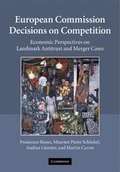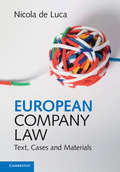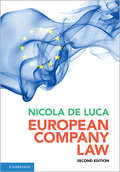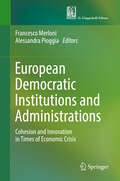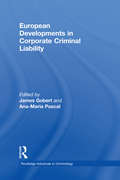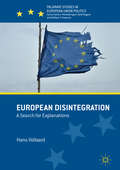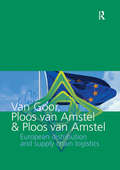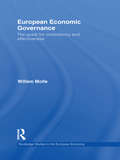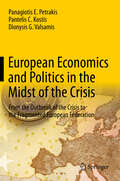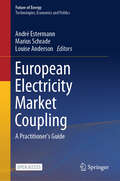- Table View
- List View
European Civil Society and Human Rights Advocacy (Pennsylvania Studies in Human Rights)
by Markus ThielAdherence to basic human rights norms has become an expected feature of states throughout the world. <P><P> In Europe, the promotion and protection of human rights through national governments has been enhanced by the diversity of intergovernmental organizations committed to this cause. The latest addition to the continent's rights organizations arrived ten years ago when, based on the EU's Lisbon Treaty, the Fundamental Rights Agency (FRA) was created as a functional institution to highlight and improve human rights within EU member states. In contrast to other regulatory agencies in the EU, the FRA provides a research-based advisory function for EU institutions and legislation and performs a public-diplomacy function in promoting fundamental rights across EU member states. <P><P>The linking of civil society with internal rights policies has yet produced very little scholarship. Markus Thiel's European Civil Society and Human Rights Advocacy not only fills this vacuum: it also offers a timely analysis in the context of Europe's proliferating human rights challenges, like the current refugee crises and the nationalist responses that geopolitical changes have provoked. <P><P>European Civil Society and Human Rights Advocacy examines the interaction between the FRA and hundreds of transnational civil society organizations working with and on behalf of vulnerable populations in EU member states and probes the high normative standards of human rights attainment and transnational participatory governance in the EU.Thiel surveys how networking among civil society organizations takes place, to what extent they are able to set the agenda or insert themselves into EU decision-making procedures, and how they are able to exploit the opportunity structure presented by the FRA's institutionalization of a voice for civil society. <P><P>Thiel draws conclusions for the larger issues of human rights promotion, transnational citizenship, and participatory governance in the region, reflecting broadly and critically on the legitimacy of EU human rights norms through a political sociology perspective.
European Civil Society and International Development Aid: Organisational Incentives and NGO Advocacy (Routledge Explorations in Development Studies)
by Balázs Szent-IványiThis book explains how and why European non-governmental development organisations (NGDOs) engage in advocacy towards the European Union (EU). It analyses the heterogenous structure of the sector, with examples ranging from large multinational networks to essentially single person NGDOs. The book provides a detailed map of the topics which have featured in NGDO advocacy since 2006, arguing that NGDOs have generally been reactive in their advocacy towards the EU. The author explains how they have contested a number of policy issues on the agendas of the EU institutions, especially around the diversion of aid to manage migration and leverage private sector investments. Furthermore, some NGDOs have used the COVID-19 pandemic as an opportunity to re-package their pre-existing policy demands. Based on an analytical framework focused around three variables, namely moral vision, funding concerns, and the need to build/maintain a ‘good’ reputation, the book explains these advocacy choices, and argues that much of NGDO advocacy seems to be consistent with funding motivations. The author highlights the importance of moral vision and reputational concerns in moderating how far NGDOs will go with funding-driven advocacy, arguing that motivations need to be looked at in their complexity, and within the specific policy context. Drawing on a range of quantitative and qualitative data sets to provide a rich and varied picture of the advocacy work of European development NGOs, European Civil Society and International Development Aid is a key reference for researchers and practitioners working in the field.
European Cohesion Policy: The Theory And Practice Of European Policy Making (Regions and Cities)
by Willem MolleThe only comprehensive text available for advanced study and professional reference, this book brings much needed clarity to both the theoretical and practical aspects of EU intervention. Integrating both theoretical and practical research in a clear and accessible structure, covering economic, social and territorial issues European Cohesion Policy provides a systematic view of the various stages of the whole policy cycle, looking in detail at: the evolution of the problems the design of the policy system the implementation in practice the evaluation of effects . An authoritative analysis of the problems and debates involved, European Cohesion Policy is essential reading for students, policy makers, development workers and researchers working in all aspects of European policy.
European Commission Decisions on Competition
by Francesco Russo Maarten Pieter Schinkel Andrea Günster Martin CarreeEuropean Commission Decisions on Competition provides a comprehensive economic classification and analysis of all European Commission decisions adopted pursuant to Articles 101, 102 and 106 of the FEU Treaty from 1962 to 2009. It also includes a sample of landmark European merger cases. The decisions are organized according to the principal economic theory applied in the case. For each economic category, the seminal Commission decision that became a reference point for that type of anticompetitive behavior is described. For this, a fixed template format is used throughout the book. All subsequent decisions in which the same economic principle was applied are listed chronologically. It complements the most widely used textbooks in industrial organization, competition economics and competition law, to which detailed references are offered. The book contains source material for teachers and students, scholars of competition law and economics, as well as practising competition lawyers and officials.
European Company Law
by Nicola De LucaTaking a text, cases and materials approach, this is the first and only student textbook on European company law, providing an insight into the subject and shedding light on its future development. Textboxes for explanatory commentary, cases and materials - such as EU legislation, official documents and excerpts from scholarly papers - are clearly differentiated from the text, allowing the student to quickly identify sources. Each chapter also includes suggestions for further reading. Structured in seven parts, the book explores a diversity of topics, from what European company law is, the common rules for establishing, financing and accounting a company, and corporate governance, to the structure of the Societas Europaeca Statute, EU company law directives, capital markets and takeover law, and insolvency. An essential resource for the growing number of graduate courses on European company law, European business law, and comparative corporate law.
European Company Law: Text, Cases And Materials
by Nicola de LucaTaking a text, cases and materials approach, de Luca's successful textbook remains the only offering for students of European company law, and has been thoroughly updated in this new edition. Chapters have been expanded to cover the latest legislation and directives on cross-border mergers, the use of digital tools, and cross-border insolvency, while figures and graphs have been introduced to help illustrate complex processes and relationships. Clearly differentiated explanatory textboxes from the first edition have been revised, and allow students to quickly identify sources such as EU legislation, official documents and excerpts from scholarly papers. The book explores a diverse range of topics, from what European company law is, to the structure of the Societas Europaea Statute, capital markets and takeover law. It continues to be an essential resource for the growing number of graduate courses in European company law, European business law, and comparative corporate law.
European Comparative Company Law
by Mads Andenas Frank WooldridgeCompany law is undergoing fundamental change in Europe. All European countries have undertaken extensive reform of their company legislation. Domestic reform has traditionally been driven by corporate failures or scandals. Initiatives to make corporate governance more effective are a feature of recent European law reform, as are measures to simplify and ease burdens on smaller and medium-sized businesses (SMEs). An increasing EU harmonisation is taking place through the Company Law Directives, and the free movement of companies is also facilitated by the case law of the European Court of Justice on the directives and the right to free movement and establishment in the EC Treaty. New European corporate forms such as the European Economic Interest Grouping (EEIG) and the European Company (SE) have added new dimensions. At a time of rapid development of EU and national company laws, this book will aid the understanding of an emerging discipline.
European Competition (Routledge-Noordhoff International Editions)
by F.J.L. Somers K.E. Davis-Ost J.E. Frencken E. HeutenEurope is increasingly becoming an everyday reality for many companies, not only for large corporations but small and medium-sized enterprises as well. European Competition offers students an introduction to the field of competition, cooperation and competition policy in the EU. To increase students' understanding of the workings of the Internal Market, most chapters start with case-studies. The book focuses on the subject areas economics and law and is written from both a business and a social/legal perspective. European Competition is an essential introductory textbook for students at both undergraduate and graduate levels in a wide range of degree and professional programmes. Including Economics, MBA and Law. It is of particular relevance to students interested in the European context of these disciplines and can be used as a core textbook for courses in European Integration or Business and International Environment in Europe and other parts of the world. This text is complementary to the book European Business Environment.
European Competition Policy and Globalization
by Terrence R. Guay Chad DamroThis book examines the domestic and international dimensions of European Union (EU) competition policy, particularly mergers, anti-competitive practices and state aids. The authors argue that important changes in EU competition policy are having profound effects on the global political economy, and these changes are best understood as European Commission responses to new domestic and international pressures. Using a two-level game analytical framework that is both intra-EU and global in scope, Damro and Guay investigate a wide variety of domestic and foreign public and private actors that interact in crucial ways to determine the development and implementation of EU competition policy. They address this broad question: In what ways do changing external and internal factors affect the evolution of the EU's competition policy and the role that the Commission plays in it? Among the conclusions is that the EU – and particularly the European Commission – has become a leading global regulator.
European Condominium Law
by Cornelius Van Der MerweThis is the first comprehensive comparative treatment of condominium (apartment ownership, commonhold, horizontal property) law in 21 European jurisdictions. This book explores the genesis of condominium law in Europe and in each of the jurisdictions represented and the use made of the condominium format to structure residential, commercial, industrial and tourist condominiums. It examines the establishment of condominiums, basic condominium concepts and the role by-laws play in establishing harmony in a condominium. Included are ten case studies, which illustrate a variety of factual scenarios and focus on providing legal solutions to practical cases. The scenarios include, amongst others, the legal consequences of a sale of apartments from building plans; restrictions on the sale and letting of apartments; the keeping of pets and the conduct of a profession (such as a medical practice) in an apartment; the sanctions against defaulters of contributions; and the requirements for undertaking maintenance and improvements.
European Consumer Access to Justice Revisited
by Stefan WrbkaEuropean Consumer Access to Justice Revisited takes into account both procedural and substantive law questions in order to give the term 'access to justice' an enhanced meaning. Specifically, it analyses developments and recent trends in EU consumer law and aims to evaluate their potential for increasing consumer confidence in the cross-border market. Via a critical assessment of the advantages and disadvantages of the means initiated at the EU level, the author highlights possible detriments to the cross-border business-to-consumer (B2C) market. To remedy this, he introduces an alternative method of creating a legal framework that facilitates B2C transactions in the EU - 'access to justice 2. 0'.
European Consumer Protection
by Mel Kenny James Devenney"This volume analyses the theory and practice of European consumer protection in the context of consolidation initiatives seen, inter alia, in the revision of the Consumer Acquis, the Draft Common Frame of Reference and the proposal for an EU Consumer Rights Directive. The issues addressed are all the more significant given the revisions to the proposed Directive, the appointment of an 'Expert Group on a Common Frame of Reference' and the Commission's 2010 Green Paper on progress towards a European Contract Law. The contributions to this volume point to the arrival of a contested moment in EU consumer protection, questioning the arrival of the 'empowered' consumer and uncovering the fault lines between consumer protection and other goals. What emerges is a model of poly-contextual EU consumer protection law, a model that challenges the assumptions in both the 2010 Green Paper and the revised proposed Consumer Rights Directive"--
European Consumers in the Digital Era: Implications of Technology, Media and Culture on Consumer Behavior (Routledge Studies in Marketing)
by Małgorzata Bartosik-PurgatConsumers make purchasing decisions every day, taking into account their needs, preferences and beliefs which may change due to various determinants; some depending on the consumers themselves and others on the organizations acting in the market. What determinants are inducing these changes in consumers` needs, perceptions, attitudes, values, and finally, purchasing behavior? This edited collection offers a comprehensive description of the consumer behavior process and the determinants that affect it in the era of digitalization. This book offers a holistic perspective of consumer behavior in the 21st century in different European cultures that are characterized by new technologies, including smartphones, AR, IoT, AI, and social media, as well as cultural changes and the Covid-19 pandemic. The first part of the book is devoted to characteristic phenomena in consumer behavior in the era of digitalization, such as changes in the consumer buying decision-making processes, e-commerce, prosumers’ and consumers` attitudes towards innovations. The second part will describe the consumers, their decision-making processes, with examples from almost all geographical regions in Europe, including Germany, Spain, Italy, Finland, Poland and Russia. Both individually and collectively, the contributors provide discussion points and practical implications resulting from the changes observed in consumer behavior in each country. European Consumers in the Digital Era provides a comprehensive overview of digital consumer behavior, offering timely insights for scholars and researchers. It will also appeal to postgraduate students of related fields, including marketing, innovation and sociology.
European Corporate Governance: Readings and Perspectives
by Thomas Clarke Jean-François ChanlatFor decades, Europe has sought to become more financially integrated with the United States and thus European legal institutions, regulatory, governance and accounting practices have faced pressures to adapt to international competitive markets. Against this backdrop, European corporate governance systems have been criticized as being less efficient than the Anglo-American market based systems. This textbook examines the unique dimensions and qualities of European corporate governance. Reforms of key institutions, the doctrine of shareholder value and the seemingly irresistible growth of CEO power and reward are critically analyzed. The book brings out the richness of European corporate governance systems, as well as highlighting historical weaknesses that will require further work for a sustainable corporate governance environment in the future. In light of the most severe financial crisis since the 1930s, this intelligent look at European corporate governance is a vital textbook for courses on corporate governance and a great supplementary textbook on a host of business, management and accounting classes.
European Democratic Institutions and Administrations: Cohesion and Innovation in Times of Economic Crisis
by Francesco Merloni Alessandra PioggiaThis book presents the results of extensive international comparative research into the effects of the economic and financial crisis on democratic institutions and social cohesion policies. The collected studies describe and analyse the measures (often referred to as "reforms") adopted to counter the crisis and the effects of these measures.It investigates three areas: the impact on the functioning of institutions, with respect to the relationship between representative institutions and governments, and the organisational structure of administrations at national and local levels; the impact that the austerity policies on public spending have on social rights; and the impact on traditional instruments of public action (administrative simplification, public services delivering, the use of common assets).The general findings highlight the effect of reducing the administrative and government capacity of the democratic institutions: the public sector, rather than being innovative and made more effective, declines, offering increasingly poor public services and making bad decisions, fuelling substantive or formal privatisation solutions, which in turn cause further weakening.
European Demography and Economic Growth (Routledge Revivals)
by W. R. LeeFirst published in 1979, European Demography and Economic Growth presents a collection of essays on the demographic development of individual European economies like Austria, Hungary, Germany, France, Italy, Norway, Portugal etc. It provides a comparative analysis to clarify many crucial issues connected with the growth in European population from mid-eighteenth century. It looks at the suitable criteria for assessing the applicability of general theory to the experience of individual nations. It showcases the over-riding contrast between substantial economic variations on a national and regional level and the existence of common underlying demographic trends. This book will be useful for scholars and researchers of economic history, political economy, European history, population geography and economics in general.
European Developments in Corporate Criminal Liability (Routledge Advances in Criminology)
by James Gobert Ana-Maria PascalWhen corporations carry on their business in a grossly negligent manner, or take a cavalier approach to risk management, the consequences can be catastrophic. The harm may be financial, as occurred when such well-regarded companies as Enron, Lehman Brothers, Worldcom and Barings collapsed, or it may be environmental, as illustrated most recently by the Gulf oil spill. Sometimes deaths and serious injuries on a mass scale occur, as in the Bhopal gas disaster, the Chernobyl nuclear explosion, the Paris crash of the Concorde, the capsize of the Herald of Free Enterprise, and rail crashes at Southall, Paddington and Hatfield in England.What role can the law play in preventing such debacles and in punishing the corporate offenders? This collection of thematic papers and European country reports addresses these questions at both a theoretical and empirical level. The thematic papers analyse corporate criminal liability from a range of academic disciplines, including law, sociology/criminology, economics, philosophy and environmental studies, whilst the country reports look at the laws of corporate crime throughout Europe, highlighting both common features and irreconcilable differences between the various jurisdictions.
European Disintegration: A Search For Explanations (Palgrave Studies in European Union Politics)
by Hans VollaardThis book accounts for whether and how the path of the European Union (EU) has developed towards potential disintegration. These questions have become particularly relevant since the outbreak of the debt crises in the Eurozone and the Brexit referendum. The author critically subverts theories of European integration and analyses the rise and fall of federations, empires and states in a comparative perspective. The most promising theory presented here indicates that Brexit is not likely to be followed by other member states leaving the EU. Nevertheless, the EU has been undermined from within as it cannot adequately address Eurosceptic dissatisfaction from both the left and right. This book is an essential read for everyone interested in the EU and its future.
European Distribution and Supply Chain Logistics
by Ad R. Van Goor Walther Ploos van Amstel M. J. Ploos van AmstelA broad vision of supply chain management is necessary to implement European distribution successfully. European Distribution and Supply Chain Logistics focuses on logistics in the European region. This book discusses proven concepts and do's & don'ts for European distribution, as well as for supply chain logistics across three clusters: Distribution and supply chain management Fundamentals of European distribution logistics Demand and supply chain management Each chapter starts with an awareness case and ends with fifteen questions for discussion, a real life case and five reflecting questions. Based on this formula the book is well-suited for students and practitioners in the area of logistics and supply chain management.
European Economic Governance: The quest for consistency and effectiveness (Routledge Studies in the European Economy)
by Willem MolleIn the course of its development the EU has had to deal with an expanding policy agenda, covering ever more subjects and an increased diversity of instruments. It has also had to deal with an increased number of member states and an extended range of partners (regional authorities, non governmental organisations). These developments have greatly increased the risk of inconsistencies between the various policies pursued and between the various levels of competence for the same policy. Inconsistent policies are less effective than they ought to be. So, they imply a welfare loss. The EU has tried to cope with the challenge of consistency by adapting its governance. Traditionally it uses mainly the regulatory method. The effectiveness of this method has recently come into question. So alternative methods are now favoured. One is the financial method; which implies more expenditure via the EU budget. The other is coordination. The application of both methods has certain advantages and disadvantages. The problem for policy makers is then to determine the choice between the modes first and the optimal level of budgetary and coordination efforts next. Notwithstanding its obvious policy relevance the problem has got little attention from academia. This book sets out to contribute to a solution by following two approaches. The first is a systematisation of the theoretical and conceptual underpinnings of the financial and coordination methods. The second is an empirical investigation into a range of European policy processes, implying to different degrees budgetary outlays and coordination.
European Economic Governance: Theories, Historical Evolution, and Reform Proposals
by Fabio MasiniThis book examines the economic theories and policies that underline the governance of the European Union. Through exploring the history of European economic governance and how this framework has evolved over time, it contextualises theoretical influences, policy debates surrounding the European Union and its instruments of governance, including the European Semester, Six Pack, Two Pack, and Fiscal Compact. Forthcoming reforms to fiscal rules and the economic policy architecture of the European Union are also discussed, with a particular focus on the impact of the COVID-19 pandemic. This book aims to give readers a broad understanding of the framework and dynamics that define European economic governance. It will be relevant to researchers and policymakers interested in the European political economy.
European Economic Integration: Limits and Prospects
by Miroslav JovanovicIn this major new text, Miroslav N.Jovanovic presents an analysis of all the major aspects of economic integration in the European Union. Beginning with an overview of the origins of European integration, he moves on to discuss in detail all the main policy areas. These include:*monetary policy*competition policy*industrial policy*fiscal policy*trade policy*the Common Agricultural Policy*foreign direct investment*regional policy.The volume also includes a discussion of less well-known policy areas, such as social policy, environmental policy and transport policy. Containing an excellent blend of theory and practice and presenting a highly complex issue in an accessible and non-technical way, this text will be an invaluable resource for students of international economics, international business and European studies.
European Economic Legal Order After Brexit: Legacy, Regulation, and Policy (Routledge-Giappichelli Studies in Law)
by Enzo CardiThis book takes an innovative approach to provide a mirror perspective of the legal systems of the UK and the EU in contemporary institutional scenarios. At the beginning of the second decade of the 21st century, the legal systems of the EU and the UK are facing challenges of epic proportions. Never before have the two legal orders been confronted with the simultaneous impact of a series of events. First, the effect of the “divorce” between the two regulatory systems caused by the UK’s withdrawal from the EU. The Negotiating Documents and the Draft Texts being discussed and aimed at leading to a `New Partnership’ are examined in the book. Second, the book discusses the impact of the coronavirus shock in all European economies leading to a substantial change of political perspective in the EU legal order implying innovative debt instruments. Third, it explores the consequences of the judicial activism of the German Constitutional Court undermining the strategic role of the European Central Bank and the primacy of the European Union Court of Justice. The book questions the effects deriving from the legacy, i.e. the foundations of the two legal systems, on handling the issues of our time, the impact on market regulation of the striking contemporary events and the unsettled consequences on policy of the current convulsing political and financial landscape. The book will be essential reading for those working in the areas of European public regulatory law.
European Economics and Politics in the Midst of the Crisis
by Panagiotis E. Petrakis Pantelis C. Kostis Dionysis G. ValsamisThis book presents an overview of the economics and politics implemented in the European Union and especially the Eurozone during the crisis of 2008-2012. Although it focuses on these four years, the analysis starts from the establishment of the European Union and covers the period up to the outbreak of the Cypriot banking crisis in mid-2013. The long-term creation of structural changes in European economics and politics is associated with a growth lag within the global economic environment dynamics. The economic and political consequences of the crisis and the development of new institutions will shape the future growth dynamics towards a Fragmented European Federation.
European Electricity Market Coupling: A Practitioner’s Guide (Future of Energy)
by Louise Anderson André Estermann Marius SchradeThis open access book provides a comprehensive overview of the European Electricity Market Coupling. Tracing the evolution of the EU&’s efforts to create an Internal Energy Market, it explores the history, principles and roles of all key actors from Transmission System Operators (TSOs) to service providers to National Regulatory Authorities (NRAs) in Single Day-ahead and Intraday Coupling. Key topics include the framework of market coupling, the day-ahead and intraday algorithms, procedures, financial settlement, and the viewpoints from traders to interested countries to join the European Electricity Market Coupling in the future. An essential read for industry professionals and scholars alike, this book offers first-hand insights into the practical processes and fundamentals of electricity trading in Europe.



